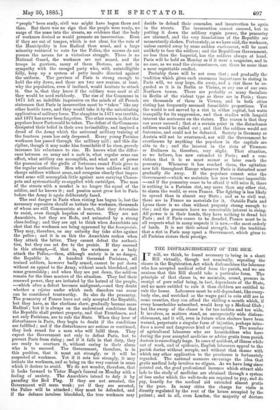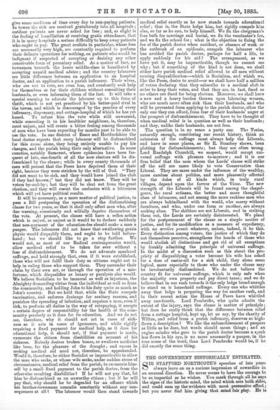THE DISFRANCHISEMENT OF THE SICK.
IT will, we think, be found necessary to bring in a short Bill virtually, though not nominally, repealing the clause in the Registration Act which disfranchises the labourer who has accepted medical relief from the parish, and we are anxious that this Bill should take a particular form. The principle of that clause is, we maintain, sound, persons in receipt of poor relief being, in fact, dependants of the State, and no more entitled to rule it than children are entitled to rule the house. Labourers must be self-dependant, like everybody else, and wretched as the wages paid in coin still are in some counties, they can afford the shilling a month which, if every householder subscribed, would keep up a Medical Club ; but the sweep of the clause is far too sudden and too wide. It involves, as matters stand, an unexpectedly wide disfranchisement, and it will, even in future when electors have been warned, perpetuate a singular form of injustice, perhaps introduce a novel and dangerous kind of corruption. The number of agricultural labourers who are householders who have• during the year accepted medicine or advice gratis from parish doctors is exceedingly large. In cases of accident, of illness while out of work, and of epidemic, English labourers appeal to the parish doctor without scruple, and without that shame with which any other application to the poorhouse is fortunately regarded. The national manners encourage the idea that gratis medical help involves no stigma. As we have long since pointed out, the good professional incomes which attract able lads to the study of medicine are obtained through a system of fees under which the well-to-do are required to pay, and do pay, heavily for the medical aid extended almost gratis to the poor. In many cities the charge for visite is directly regulated by the rent of the house occupied by the patient ; and in all, even London, the majority of doctors give some modicum of time every day to non-paying patients. In towns the sick are received gratuitously into all hospitals ; outdoor patients are never asked for fees ; and, so slight is the feeling of humiliation at receiving gratis attendance, that it is in many hospitals a serious difficulty to keep away patients who ought to pay. The great °enlists in particular, whose fees are necessarily very high, are constantly required to perform their delicate operations for nothing, on patients who would be indignant if suspected of accepting or desiring any other conceivable form of pecuniary relief. As a matter of fact, no townsman beneath the lower middle-class is humiliated by accepting unpaid medical advice ; and the country labourers see little difference between an application to an hospital doctor, and an application to a parish infirmary. Their wives, who are not to vote, see even less, and constantly seek help for themselves or for their children without consulting their husbands, or even informing them of the fact. It will take a special warning to educate the labourer up to this form of thrift, which is not yet practised by his better-paid rival in the towns, and which is discouraged by the practice of every infirmary, dispensary, and cottage-hospital of which he has yet heard. To refuse him the vote while still unwarned, while conceding it to his healthier neighbour, is, therefore, moat unjust, and will create a bitter feeling among thousands of men who have been expecting for months past to be able to use the vote. In one district of Essex and Hertfordshire the local doctor reports that every labourer will be disfranchised for this cause alone, they being entirely unable to pay his charges, and the parish being their only alternative. In some counties, notably Somerset, where epidemics have been frequent of late, one-fourth of all the new electors will be disfranchised by the clause; while in every county thousands of men will protest that the Peers have deprived them of their right, because they were stricken by the will of God. " They did not want to be sick, and they would have joined the club if they had known ;" but they did not know. They will be voters by-and-by ; but they will be shut out from the great election, and they will resent the exclusion with a bitterness which will yet have political results.
It will be necessary, as a mere matter of political justice, to pass a Bill postponing the operation of the disfranchising clause for two years, so that it shall only affect men who, after dire warning, consciously and wilfully deprive themselves of the vote. At present, the clause will have a reflex action which is unjust, as unjust as it would be to declare suddenly that non-payment of the education-fee should make a man a pauper. The labourers did not know that swallowing gratis physic would disqualify them, and ought to be told beforehand ; but we should like to go a step further. We would not, as most of our Radical contemporaries would, allow medical relief to be taken for ever without a fear of disfranchisement. We do not advocate manhood suffrage, and hold strongly that, even if it were established, those who will not fulfil their duty as citizens ought not to help in ruling those who support them. They surrender their claim by their own act, or through the operation of a misfortune, which disqualifies as lunacy or paralysis also would. We believe Socialism to be immoral as well as injurious, the Almighty demanding virtue from the individual as well as from the community, and holding John to his duty quite as much as John's country. But we hold that, while the State compels vaccination, and enforces drainage for sanitary reasons, and punishes the spreading of infection, and requires a man, even if sick, to perform all duties in the way of ratepaying, it accepts a certain degree of responsibility for the health of the community precisely as it does for its education. And we do not see, therefore, why it should not act in cases of sickness as it acts in cases of ignorance, and while rigidly requiring a fixed payment for medical help, as it does for educational help, it should not, if that payment is made, exonerate the citizen from disabilities on account of his sickness. Nobody desires broken bones, or swallows medicine like beer, for the pleasure of the draught ; and excess in seeking medical aid need not, therefore, be apprehended. Would it, therefore, be either Socialist or impracticable to allow the man who seeks, or whose wife seeks, under sudden stress of circumstances, medical relief from the parish, to exonerate himself by a small fixed payment to the parish doctor, from the otherwise resulting disabilities ? If he will not pay that, let him be disfranchised as an unworthy citizen ; but if he will pay that, why should he be degraded for an offence which his brother-townsman commits constantly without any consequences at all ? The labourer would then stand towards medical relief exactly as he now stands towards educational relief ; that is, the State helps him, but rigidly compels him also, so far as he can, to help himself. We fix the clergyman's fees both for marriage and burial, we fix the vaccinator's fee, and we fix the school fee ; what is the objection to fixing the fee of the parish doctor when accident, or absence of work, or the outbreak of an epidemic, compels the labourer who has avoided the parish doctor, perhaps for half a life, to apply suddenly for his aid ? The arrangement, as we have put it, may be impracticable, though we cannot see why ; but if something of the kind is not done, we shall either have parish medical relief allowed to all men without causing disqualification—which is Socialism, and which we, like the Peers, desire to avoid—or we shall have half a million of voters declaring that they subscribe to a medical club in order to keep their votes, and that they are, in fact, fined as no others are fined for being electors. Moreover, we shall have a new and a heavy burden thrown upon labouring women, who are much more often sick than their husbands, and who will be prevented from applying to the parish doctor, often the only one they can afford, from fear of their husbands' anger at the prospect of disfranchisement. They have to be thought of when medical relief is in question as well as their husbands ; and they, unlike their husbands, are not free.
The question is in no sense a party one. The Tories, naturally enough, considering our recent history, think an extension of the suffrage must always help the Liberals, and have in some places, as Sir E. Strachey shows, been plotting for disfranchisements ; but they are often wrong. Lord Randolph Churchill, we suspect, would accept universal suffrage with pleasure to-morrow ; and it is our firm belief that the men whom the Lords' clause will strike off the roll are more likely to vote Conservative than Liberal. They are more under the influence of the wealthy, more careless about politics, and more pleasantly affected by the doles of all kinds which, in truly rural villages, depend upon the favour of the Vicar. The new strength of the Liberals will be found among the chapelgoers, the rural artisans, the better and more thoughtful class of labourers, and not among the more reckless men who are always behindhand with the world, who marry without furniture, and who, under one form or another, are always seeking alms. The shiftless are not Liberals, and in striking them out, the Lords are certainly disinterested. We plead for the postponement of the clause as a simple matter of justice, and for its modification as a measure of expediency, with no arriere pease'e whatever, unless, indeed, it be this. Every distinction among voters, the justice of which they do not themselves perceive, strengthens the hands of those who would abolish all distinctions and get rid of all exceptions by frankly admitting the principle of universal suffrage. In the midst of a discussion such as this about the propriety of disqualifying a voter because his wife has asked for a dose of castor-oil for a sick child, they alone seem logical, more especially to those who under the clause may be involuntarily disfranchised. We do not believe the country fit for universal suffrage, which is only safe when the majority own property and pay direct taxes ; and we do believe that in our rush towards it the only ledge broad enough to stand on is household suffrage. Every one who whittles away that ledge is preparing the way for another rush, and in their recent action the House of Peers have whittled away one-fourth. Lord Pembroke, who quite admits the extent of the injury, says the clause is matter of principle; but does he really think that the difference between relief from a cottage hospital, kept up, let us say, by the charity of Wilton, and relief from a parish infirmary, deserves so highflown a description ? We like the enfranchisement of paupers as little as he does, but words should mean things ; and an engine minder who goes to the parish doctor because a spark has flown in his eye, is no more necessarily a pauper, in the true sense of the word, than Lord Pembroke would be, if he did exactly the same thing.















































 Previous page
Previous page